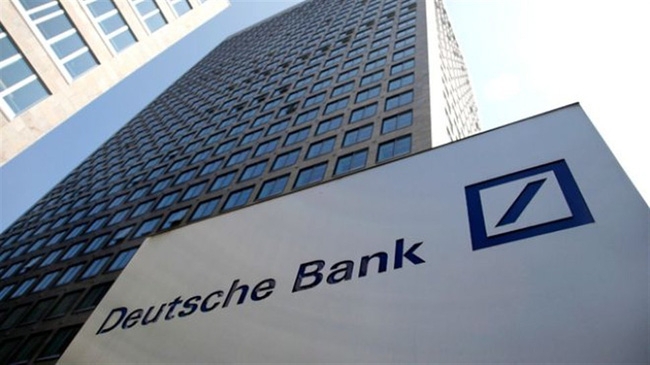Deutsche Bank USA failed 'stress test': US Fed Reserve
 |
| Deutsche Bank USA failed 'stress test': US Fed Reserve, Photo AFP |
The Fed gave a "conditional" pass to Wall Street investment behemoths Goldman Sachs and Morgan Stanley, whose capital backstops sank below required levels due to one-time charges tied to December's tax cuts, officials said.
But the Fed "objected to the capital plan of DB USA Corporation because of widespread and critical deficiencies across the firm's capital planning practices," according to the annual test results.
Should DB hit hard times in an economic downturn or financial crisis, poor data capabilities and internal controls, bad forecasts for revenue and losses under stress, and substandard internal audits would leave the bank in danger, the Fed announced.
The stinging rebuke for Deutsche Bank, Europe's second-largest lender, came as shareholders continue express serious doubts about the bank's health. The bank's shares on Wednesday hit a two-year low in Frankfurt.
Deutsche Bank's US operations failed stress tests in 2015 and 2016 but this was the first time its local holding company, created in 2016, was subjected to the tests.
Randal Quarles, the Fed's newly-appointed vice chairman for banking supervision, said the results showed the US banking sector was largely sound, since all but one of the 35 banks tested, which together account for 80 percent of all US banking assets, earned passing grades.
The results "demonstrate that the largest banks have strong capital levels, and after making their approved capital distributions, would retain their ability to lend even in a severe recession," he said in a statement.
Passing banks are able to pay dividends to shareholders, but any DB USA payments must be approved by the Fed. However, this would only impact transfers back to its corporate parent in Germany.
DB USA, which had US$133 billion in assets of the end of the first quarter, will be required to address deficiencies identified by regulators, Fed officials told reporters.
ALL BUT DB PASS
DB USA said in response to the results that it was working to improve its operations. The company stressed that the Fed did not find its capital would fall below required levels, but failed the bank for "qualitative reasons."
"DBUSA continues to make progress across a range of programs and will continue to build on these efforts and to engage constructively with regulators to meet both internal and regulatory expectations," the bank said in a statement.
Other foreign banks facing the qualitative assessments included Barclays, UBS, Credit Suisse, HSBC and TD Bank. All passed.
Because of their conditional passes, Goldman and Morgan Stanley will see their shareholder payouts capped at levels seen in prior years.
This will let them "build capital over the next year," the Fed said in a statement.
Given the current robust health of the world's largest economy, the Fed imposed a harsher testing scenario than it had in recent years, with unemployment shooting up to 10 percent, GDP shrinking and financial conditions worsening.
The first round of stress test results released last week - the quantitative test - found the banking sector generally ready to face a severe global recession. But this week's qualitative test looked at capital planning, including share buybacks and dividend payments.
The stress tests were required under the 2010 Dodd-Frank financial reform laws enacted in the wake of the global financial crisis.
US financial firm State Street also received a conditional pass in the quantitative test for its capital planning, after regulators found that risky transactions would produce large losses under the stress scenario. That bank will have to improve management and analysis, according to the Fed.
The tests showed a more resilient banking sector over all. Collectively, the common-equity capital ratio, which measures higher quality capital against risk-weighted assets, more than doubled last year to 12.3 per cent, up from 5.2 per cent in 2009 during the Great Recession.
What the stars mean:
★ Poor ★ ★ Promising ★★★ Good ★★★★ Very good ★★★★★ Exceptional
 Tag:
Tag:
Related Contents
Latest News
More News
- Cashless payments hit 28 times GDP in 2025 (February 04, 2026 | 18:09)
- SSIAM and DBJ launch Japan Vietnam Capital Fund (February 04, 2026 | 15:57)
- Banks target stronger profits, credit growth in 2026 (February 04, 2026 | 15:43)
- Vietnam on path to investment-grade rating (February 03, 2026 | 13:07)
- Consumer finance sector posts sharp profit growth (February 03, 2026 | 13:05)
- Insurance market building the next chapter of protection (February 02, 2026 | 11:16)
- NAB Innovation Centre underscores Vietnam’s appeal for tech investment (January 30, 2026 | 11:16)
- Vietnam strengthens public debt management with World Bank and IMF (January 30, 2026 | 11:00)
- Corporate bond market poised for stronger growth cycle (January 28, 2026 | 17:13)
- Vietnam's IPO market on recovery trajectory (January 28, 2026 | 17:04)






















 Mobile Version
Mobile Version